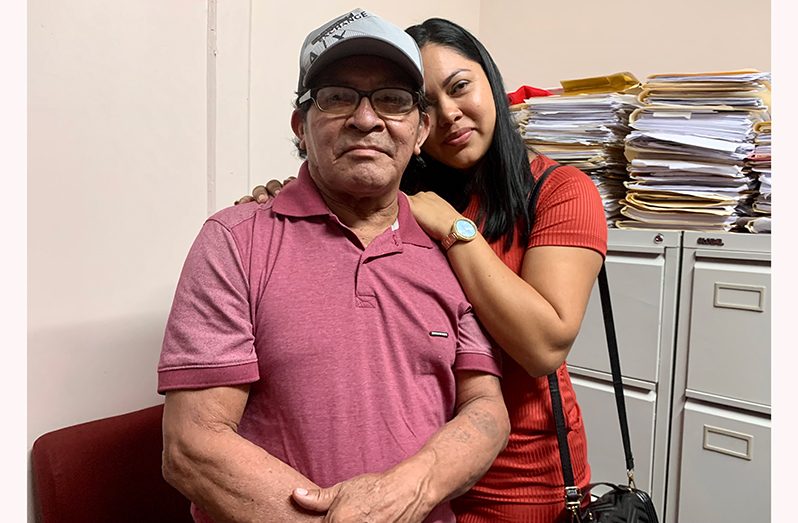BEING poisoned, shot at and living in fear were among the things 68-year-old Jones Raymond endured for nine years before a judge agreed that his detention without trial was unfair and ordered that he be freed.
Raymond, a resident of Micobie in Region Eight, was accused of killing a man in 2012 and, through his attorney, Treiq Mohammed, he filed an action in the High Court arguing that the state’s delay in prosecuting him for the crime was a breach of his constitutional rights.
Last Friday, moments before granting him his freedom, Justice Sandil Kissoon presiding in the Demerara High Court, related that Raymond had been an inmate on remand at the Camp Street Prison and other penal institutions for the offence of murder since December 28, 2012, a period of nine years, six months and 18 days.
After noting that the period was equivalent to almost 15 prison years, he emphasised that, under Article 144 of the Constitution, every citizen is guaranteed a free trial within a reasonable time by an impartial tribunal.
“I was incarcerated and punishing,” the man said on Monday, during a press conference held at his attorney’s South Road, Georgetown office.
Raymond was charged with the murder of Gary Joseph, who was killed on December 26, 2012. According to reports, Raymond shot the man with an arrow and bow during a misunderstanding.
Raymond in speaking of the incident admitted to killing Joseph but claimed that he acted in self-defence.
“I didn’t have no intention killing this man or had no intention killing anybody in my life… He [Joseph] rushed to me with a bottle in his hand and I had to take my weapon and push it towards him,” Raymond recounted.
While detailing the inhuman treatment and hardships he faced while on remand, he said he would always remember the day of the 2017 prison riots when he was also attacked and shot. He also alleged that threats were made to his life.
“They shoot we in the church. I can’t forget these things…I prayed every day and night; the food wasn’t nice, eating slush every day and drinking tea without sugar,” he said.
Due to the lack of proper care, Jones said he now suffered from high blood pressure and visual and hearing impairment.
“I can’t see or hear good. Is jail caused all this,” the man said.

Among other things, he disclosed that while incarcerated he even lost his identity since his name was filed as “Raymond Jones.”
“My name is Jones Raymond but they had me as Raymond Jones and I asked them if they had any charges concerning Jones Raymond and they said no…I asked in the Essequibo Court, they said they have no charges against me,” he said.
While incarcerated, Raymond was reunited with his daughter, Nikita, who had returned to Guyana after living in Brazil for several years.
She was moved to tears as he explained that after learning of his whereabouts, she immediately visited him at the prison.
She soon learnt that her father was abandoned and she began working to get him out. With assistance from the Ministry of Amerindian Affairs, Nikita hired an attorney and began the paperwork in pursuit of her father’s freedom.
Meanwhile, Raymond’s attorney said that had it not been for the court challenge, his client would still be in prison.
“In this specific case, it was more specific in the sense that I believe if this matter didn’t come up at all, he would have been in jail, languishing away because he is a man of Amerindian descent, and I feel like they don’t have the representation they truly need,” he said.
The attorney is still in talks with the family with regards to filing a lawsuit against the state seeking liability for the damage to his character and distress.
“Justice delayed is justice denied,” Mohammed said as he mirrored the sentiments of Justice Kissoon, who in his ruling said that the “unthinkable” occurred against Raymond without compassion, conscience and without judicial discretion.
“I’m unable to contemplate how did we in the criminal justice system arrive at this juncture, where in 2022 a citizen can serve the equivalent of a few months short of a 15-year prison sentence on remand and this is somehow acceptable in the context of the system that prevails,” Justice Kissoon said in his ruling.
In quoting Indian Supreme Court’s Justice Bhagwati, Justice Kissoon said: “What faith can these lost souls have in the judicial system, which denies them a fair trial for so many years, and keeps them behind bars, not because they are guilty, but because the courts have no time to try them.”
As such, the judge found that the man’s constitutional rights had been violated and infringed upon in the circumstances of the inordinate period of delay and his pretrial incarceration for a period of time that accords with a prison sentence of almost 15 years.
“I believe it is high time for judges of the land to take a firmer stand as soon as possible in a matter of this sort where the principle is of infinitely more importance than the case,” he said.
The judge ordered that all pending criminal proceedings against the accused be halted permanently and that he be immediately released.




.jpg)









